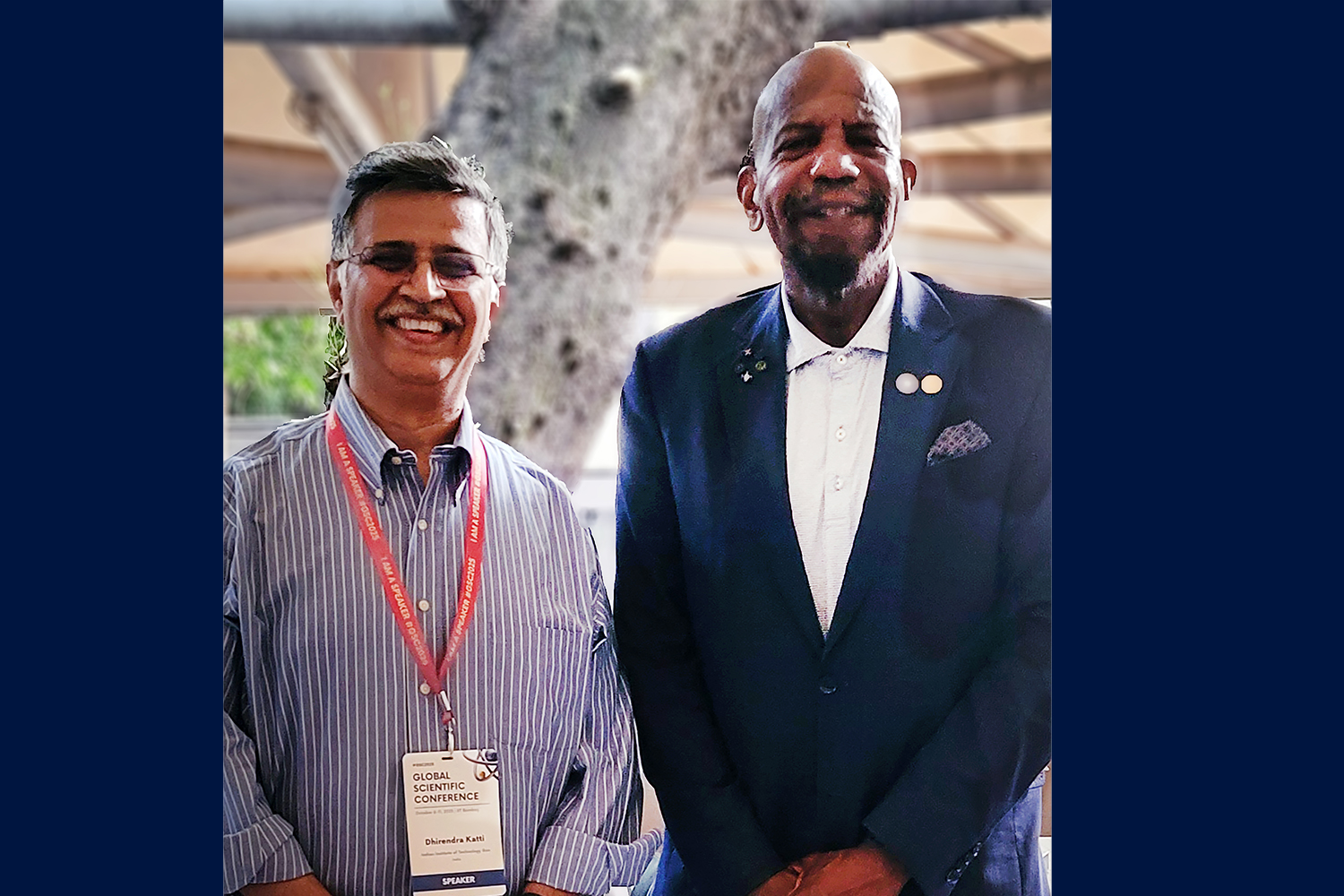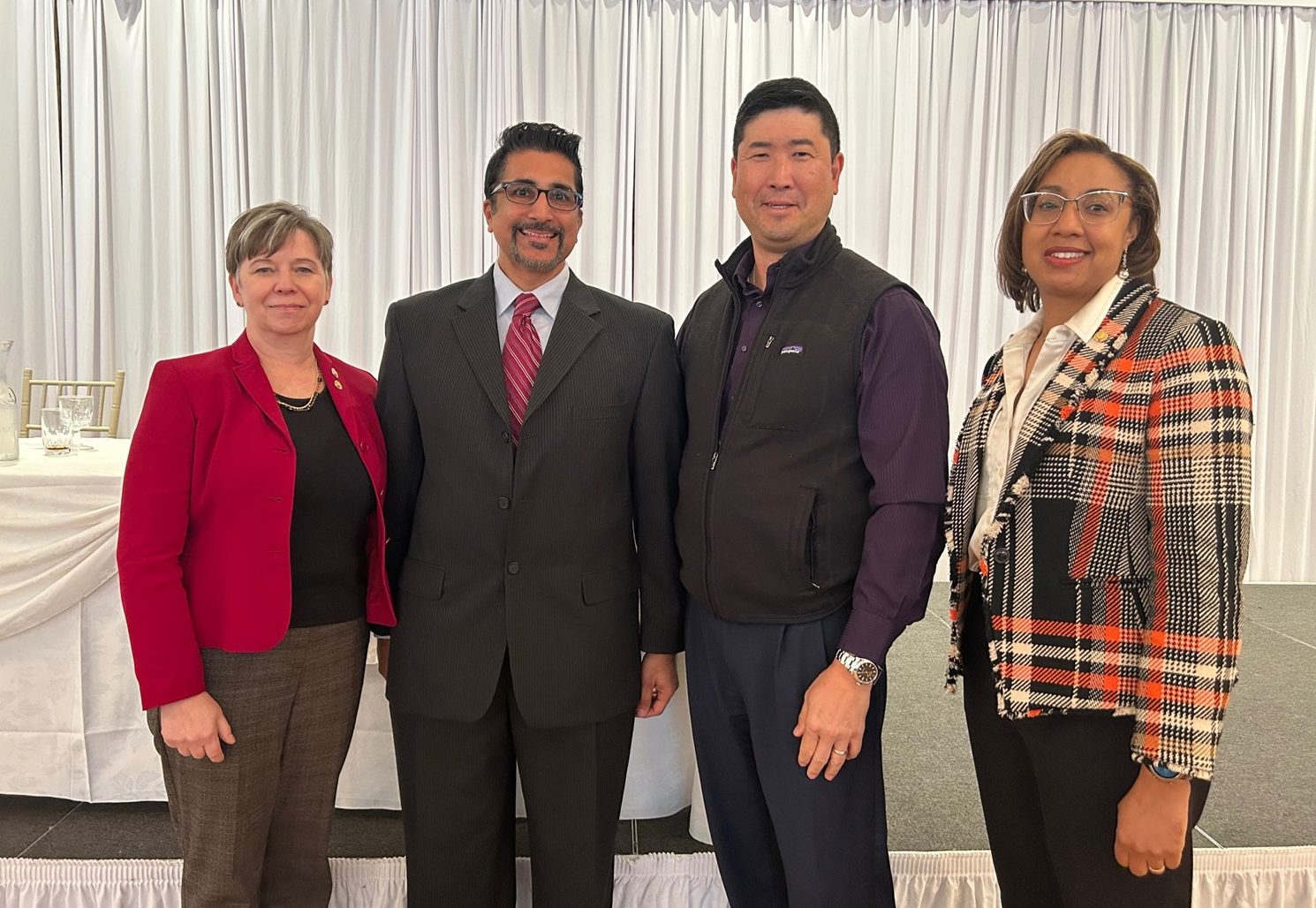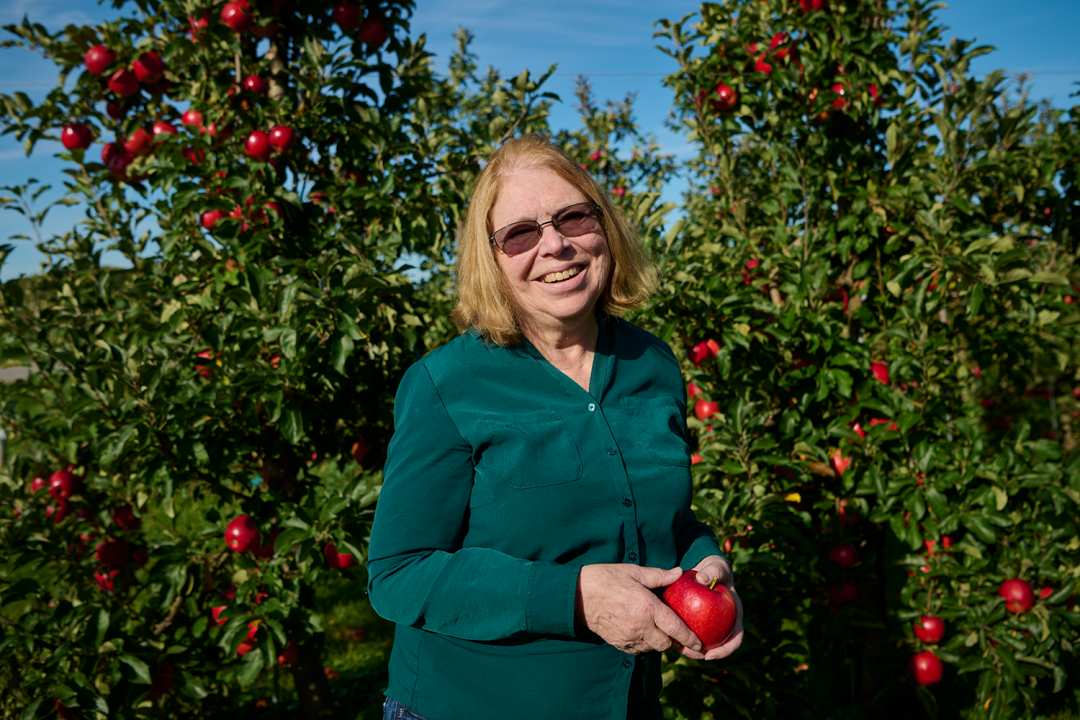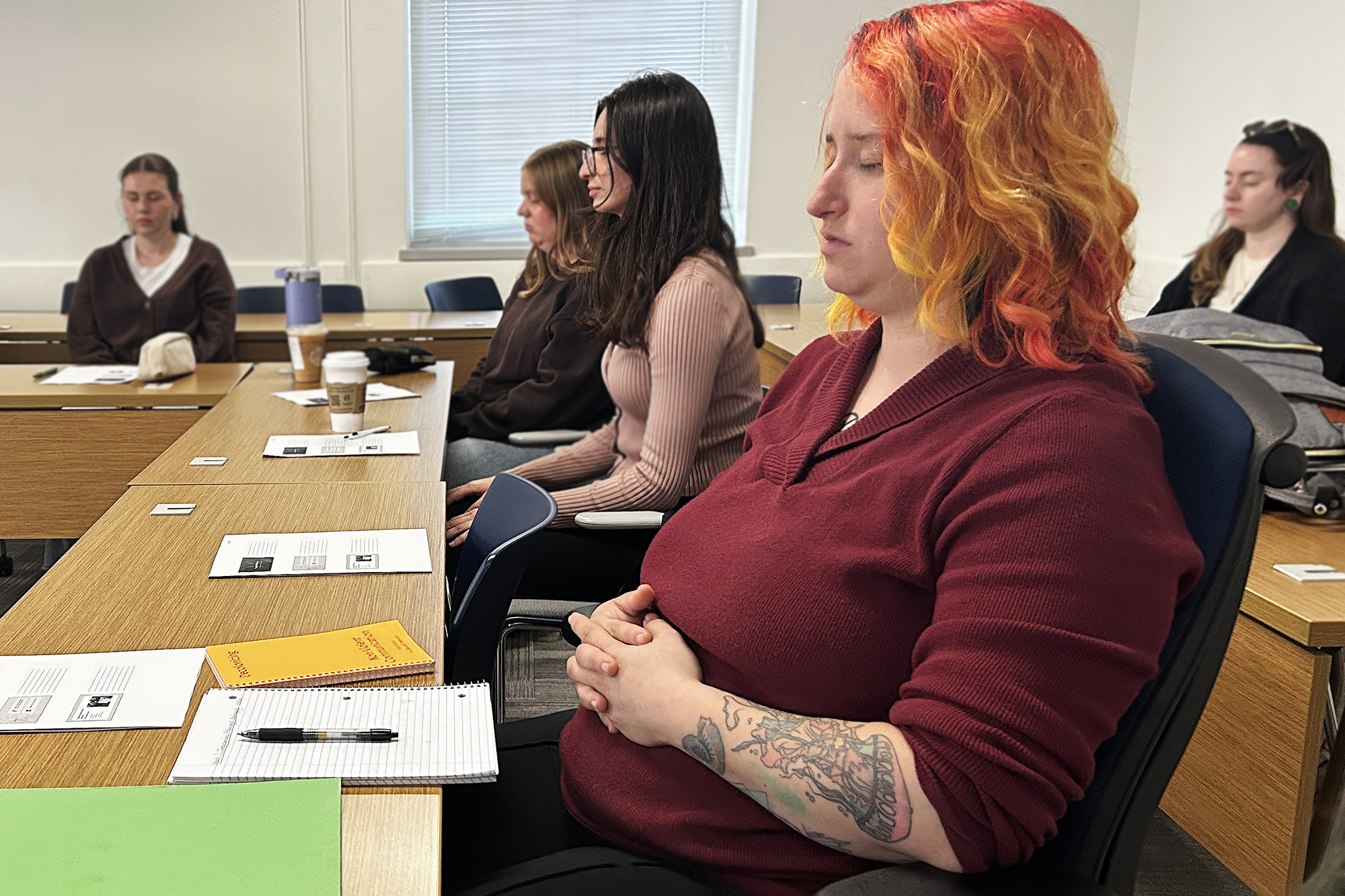Commitment to Energy Sustainability Links Huskies From Different Generations Through International Contest
Zimbabwe is almost 7,700 miles from Storrs as the crow flies, but for months, it was never far from the minds of UConn students and budding energy innovators Rosemary Moyo ’27 (ENG) and Shai Verma ’27 (ENG).
As Werth Innovators Program participants, they teamed to envision how a sustainable housing development could be built in the peri-urban, high-density Zimbabwean community of Mbizo using affordable and reliable energy sources, accessible materials, low emissions, and green-friendly home designs.
Their plan was so highly detailed and pragmatically designed that they won the grand prize of $10,000 in the first year of the Energy Mentors “Power the Community” International College Design Competition in 2024, beating about 50 other teams worldwide.
And there’s another Husky connection: Coincidentally, the Energy Mentors nonprofit organization and its competition were launched by UConn alum Don Victory ’81 (ENG), who spent his career supporting innovation in the energy sector.
The application cycle for the competition’s second year is underway, and some UConn students are participating again as part of their studies in the Werth Institute for Entrepreneurship and Innovation and/or other UConn programs.
Though they’re Huskies from different generations, Victory shares a commitment with Moyo and Verma to clean energy innovation that is also one of the underpinnings of UConn’s academic and research enterprise, and key to its Strategic Plan.
Upon his retirement from ExxonMobil, Victory launched a second career as founder of Energy Mentors, which continues that work through education, mentoring, collaborations on sustainable energy, and the “Power the Community” contest.
And while Victory was not among those who judged the entries, he admits to a lot of Husky pride over the fact that the winners were from his alma mater, and unabashed admiration for the creativity and innovation underpinning Moyo’s and Verma’s proposal.
“The world has made incredible progress in lifting people out of poverty through access to reliable energy sources, but that work isn’t done yet. The challenge we face right now is how to make that energy not only available, but also more sustainable and cleaner,” Victory says.
“That’s why the design that Rosemary and Shai put together is so compelling,” he says. “For students who are at the very beginning of their careers to put together such a sophisticated design with such pragmatic energy realism is very impressive.”
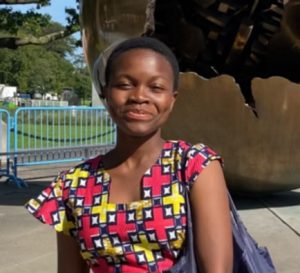
Moyo learned of the “Power The Community” competition last year through the Werth Innovators Program and invited Verma to team up.
For Moyo, the project has deep personal ties, given that Mbizo is a suburb of her home city of Kwekwe in Zimbabwe’s Midlands province. And Verma, who originates from Northern India, was among Moyo’s first new UConn friends when they met at freshman orientation.
Naming their team “Creativity in Sustainability,” they blended their skills as majors in biomedical engineering and computer science, respectively, to develop their contest submission.
They knew that any new housing envisioned in Mbizo would need to consider the unreliable nature of the local energy grid, the environmental impact of a nearby ferrochrome mining and smelting operation, and the need to provide open space for farming and recreational purposes.
On top of all of those factors, the housing development would need to be large enough to accommodate 2,000 families; affordable on the combined salaries of a nurse and teacher; and run on reliable, sustainable, accessible energy sources.
Although energy availability in much of the African continent has increased in recent years, just over 60% of Zimbabwe’s population is connected to the energy grid. Access varies widely depending on whether an area is urban or rural, and fossil-fuel sources of coal, gas, and oil are growing more quickly there than renewable sources.
Half a world away in Storrs, Moyo and Verma had their work cut out for them if they were to envision an entirely new and highly sustainable way to develop cost-effective housing options in Mbizo.
Using a range of statistical tools, 3D simulations on Google Earth, and calculations of everything from kilowatt hours to carbon dioxide emissions, they found that some of Mbizo’s presumed problems were also the key to potential solutions.
Despite the energy grid’s instability, the area receives abundant sunshine and therefore is ideal for solar power. To plan for times when the grid falters, they included plans for backup batteries to harness and store the excess solar energy generated.
And while the region’s industrial operations add to air pollution considerations, a nearby power plant produces fly ash – an easily obtainable, cheap, ideal substance from which to create the concrete needed to build the new homes.
The homes themselves were designed with natural ventilation to reduce energy consumption, natural gas cooking and other features, and were oriented in a way that includes a slightly slanted roof from east to west to ensure full sunlight on the solar array and shade for those inside.
All told, compared to other communities, their development would reduce CO2 emissions by about 27% due to the many considerations they used in their planning.
Moyo says she grew up with an interest in renewable energy since her mother is an electrical engineer with a specialty in that field, and is considering ways in which her love for the field may become part of her career plans.
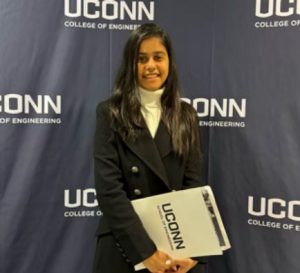
As winners of the Energy Mentors “Power the Community” contest, Moyo and Verma won $10,000 in unrestricted funds, part of the competition’s overall pot of $31,000 in awards.
“Their contest entry wasn’t flagged ‘University of Connecticut’ and I wasn’t a judge, so I had nothing to do with them winning the award, but I’m immensely proud of them nonetheless, as I’m sure UConn is as well,” Victory says.
Moyo says they initially did not know they had won the competition until Energy Mentors broadcast the award ceremony live on YouTube. Even when they announced that the top entry focused on Zimbabwe, Moyo thought perhaps another team had also developed a plan there, given that competitors had entered from around the world.
“I only believed when they finally announced our team’s name, which was a relief as my heart was pounding and I was scared we hadn’t made it,” she says. “I was happy when we won as it gave me hope of plan implementation in the future in my home country.”
Verma says she is also thankful for the motivation she received from Moyo, Victory, and her parents as she and Moyo teamed on the project. It also has helped to inspire her in her career planning.
“I will continue to take up sustainability projects in the future, because it is the tomorrow for our planet and is how our planet is going to survive and support the next generation of humans,” she says.
Latest UConn Today
- UConn Professor Sir Cato T. Laurencin Delivers Plenary Lecture at the ACS Global Scientific ConferenceLaurencin traveled to Mumbai, India to serve as the Plenary Speaker at the American Chemical Society (ACS) Global Scientific Conference.
- UConn Creates Family Medicine LeadersThree graduates of UConn School of Medicine elected leaders of the American Academy of Family Physicians and its Connecticut Chapter.
- Meet the Undergraduate: Iris Yu ‘26 (CLAS, SFA)Yu demonstrates her creativity through diverse artwork depicting the visual culture of the Asian body
- UConn Magazine: Inventor of your Next Favorite AppleAll hail Snap Dragons and Autumn Crisps: What it means to be queen of the fruit breeding universe
- Finding Presence: Using Mindfulness to Transform Social Work Education at UConn"Social workers carry the world’s challenges on their shoulders," says Associate Professor and course instructor Caitlin Elsaesser. "By practicing mindfulness—an energy of awareness—we nurture the presence and compassion that make transformative healing and advocacy possible."
- Tales From the CollectionsCollecting, skinning, and skeletonizing – for science!








